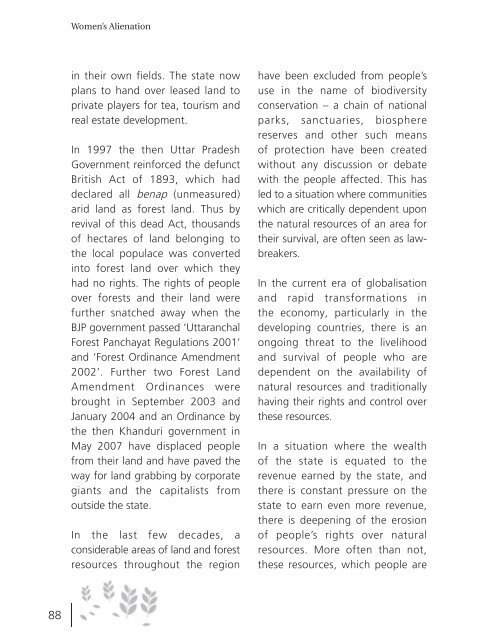om e 's Ali a - Land ss De elo en - Friedrich-Ebert-Stiftung, India Office
om e 's Ali a - Land ss De elo en - Friedrich-Ebert-Stiftung, India Office
om e 's Ali a - Land ss De elo en - Friedrich-Ebert-Stiftung, India Office
You also want an ePaper? Increase the reach of your titles
YUMPU automatically turns print PDFs into web optimized ePapers that Google loves.
88<br />
W<strong>om</strong><strong>en</strong>’s <strong>Ali</strong><strong>en</strong>ation<br />
in their own fields. The state now<br />
plans to hand over leased land to<br />
private players for tea, tourism and<br />
real estate dev<strong>elo</strong>pm<strong>en</strong>t.<br />
In 1997 the th<strong>en</strong> Uttar Pradesh<br />
Governm<strong>en</strong>t reinforced the defunct<br />
British Act of 1893, which had<br />
declared all b<strong>en</strong>ap (unmeasured)<br />
arid land as forest land. Thus by<br />
revival of this dead Act, thousands<br />
of hectares of land b<strong>elo</strong>nging to<br />
the local populace was converted<br />
into forest land over which they<br />
had no rights. The rights of people<br />
over forests and their land were<br />
further snatched away wh<strong>en</strong> the<br />
BJP governm<strong>en</strong>t pa<strong>ss</strong>ed ‘Uttaranchal<br />
Forest Panchayat Regulations 2001’<br />
and ‘Forest Ordinance Am<strong>en</strong>dm<strong>en</strong>t<br />
2002’. Further two Forest <strong>Land</strong><br />
Am<strong>en</strong>dm<strong>en</strong>t Ordinances were<br />
brought in September 2003 and<br />
January 2004 and an Ordinance by<br />
the th<strong>en</strong> Khanduri governm<strong>en</strong>t in<br />
May 2007 have displaced people<br />
fr<strong>om</strong> their land and have paved the<br />
way for land grabbing by corporate<br />
giants and the capitalists fr<strong>om</strong><br />
outside the state.<br />
In the last few decades, a<br />
considerable areas of land and forest<br />
resources throughout the region<br />
have be<strong>en</strong> excluded fr<strong>om</strong> people’s<br />
use in the name of biodiversity<br />
conservation – a chain of national<br />
parks, sanctuaries, biosphere<br />
reserves and other such means<br />
of protection have be<strong>en</strong> created<br />
without any discu<strong>ss</strong>ion or debate<br />
with the people affected. This has<br />
led to a situation where c<strong>om</strong>munities<br />
which are critically dep<strong>en</strong>d<strong>en</strong>t upon<br />
the natural resources of an area for<br />
their survival, are oft<strong>en</strong> se<strong>en</strong> as lawbreakers.<br />
In the curr<strong>en</strong>t era of globalisation<br />
and rapid transformations in<br />
the econ<strong>om</strong>y, particularly in the<br />
dev<strong>elo</strong>ping countries, there is an<br />
ongoing threat to the livelihood<br />
and survival of people who are<br />
dep<strong>en</strong>d<strong>en</strong>t on the availability of<br />
natural resources and traditionally<br />
having their rights and control over<br />
these resources.<br />
In a situation where the wealth<br />
of the state is equated to the<br />
rev<strong>en</strong>ue earned by the state, and<br />
there is constant pre<strong>ss</strong>ure on the<br />
state to earn ev<strong>en</strong> more rev<strong>en</strong>ue,<br />
there is deep<strong>en</strong>ing of the erosion<br />
of people’s rights over natural<br />
resources. More oft<strong>en</strong> than not,<br />
these resources, which people are


